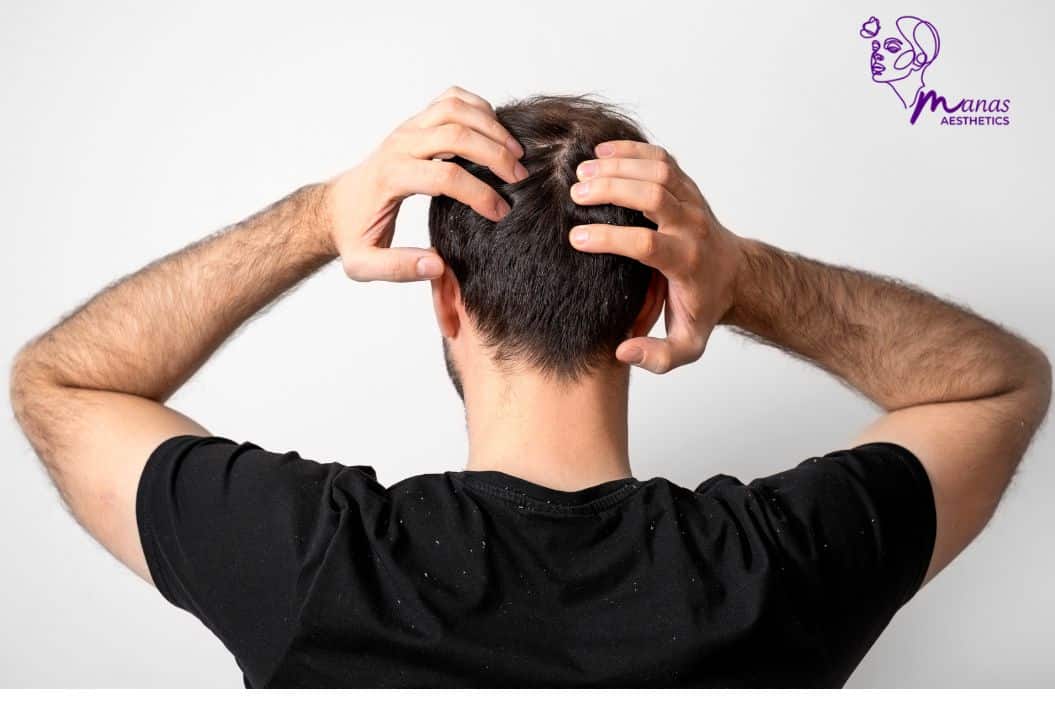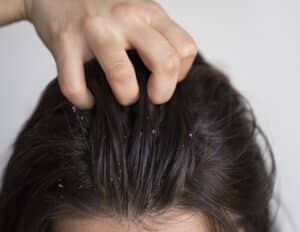Dandruff is a common scalp concern that affects millions worldwide, with an intensity that often spikes in the winter months. For many, the dry, cold weather brings more than just the usual seasonal woes—it intensifies scalp issues, leading to an uncomfortable and itchy scalp. This blog will explore the dandruff causes that get worse during winter and outline effective winter dandruff treatment options, providing a guide to maintaining a healthy, flake-free scalp throughout the colder season.
What Causes Dandruff?
To understand why dandruff worsens in the winter, it’s helpful first to examine the primary dandruff causes. it is typically a result of one or a combination of the following:
-
Malassezia Fungus:
This naturally occurring yeast on the scalp can lead to dandruff when it grows out of control, which often happens when there’s excess oil on the scalp. The fungus breaks down oils, producing oleic acid, which can irritate the scalp and lead to flaking.
-
Dry Scalp:
When the scalp is too dry, the skin becomes prone to flaking. This is especially common in winter, as cold air and indoor heating can strip away natural moisture.
-
Excess Oil Production:
Some people’s scalps produce extra sebum, which can lead to an imbalance, allowing Malassezia to grow and causing flakes.
Dandruff can occur year-round, but winter dandruff often exacerbates the situation due to specific seasonal conditions. Understanding these dandruff causes is essential for effective dandruff treatment.
Why Does Dandruff Worsen in Winter?
Winter’s specific environmental factors tend to create a perfect storm for worsening dandruff. Here’s why:
-
Dry Air:
Winter air is naturally low in humidity, leading to a drying effect on the skin and scalp. This dryness can cause the scalp to flake more easily, intensifying dandruff symptoms.
-
Indoor Heating:
Most of us rely on indoor heating to stay warm in the winter, but these systems also sap moisture from the air. The result? A parched environment that can leave the scalp drier than usual, making winter dandruff treatment necessary.
-
Cold Weather:
Cold temperatures cause the body to adjust oil production, which may result in either too much oil or not enough. The scalp often reacts with imbalances that can lead to or worsen dandruff.
-
Hat-Wearing:
Wearing hats to stay warm can trap moisture and sweat on the scalp. This creates a warm, moist environment that can encourage fungal growth, further increasing dandruff.
How to Prevent and Manage Winter Dandruff
While winter dandruff is persistent, adopting a few winter-specific care strategies can help reduce its severity. Here are some effective ways to get rid of dandruff:
-
Hydrate Your Scalp:
Using moisturizing products on the scalp can help retain hydration and reduce flaking. Look for leave-in conditioners or oils that are specifically formulated as scalp treatment for dandruff.
-
Choose the Right Shampoo:
Switch to a shampoo designed for dandruff, especially one with active ingredients like zinc pyrithione, ketoconazole, or salicylic acid. These ingredients address different dandruff causes and offer effective dandruff treatment.
-
Limit Hot Showers:
Though it may be tempting in the colder months, hot water strips the scalp of its natural oils, worsening dryness. Opt for lukewarm water instead to help retain scalp moisture.
-
Avoid Over-Washing:
Washing hair too frequently can dry out the scalp, exacerbating flaking. Aim to wash only two to three times a week with a gentle shampoo to keep the scalp from losing its natural oils.
-
Use Humidifiers Indoors:
A humidifier can add moisture back into indoor air, making it easier for your scalp to retain its natural moisture levels. This can be an important tool in your winter dandruff treatment plan.
Home Remedies to Try
For those interested in natural ways to get rid of dandruff, these remedies can provide gentle yet effective relief from Winter Dandruff:
-
Coconut Oil Massage:
Coconut oil is known for its moisturizing and antifungal properties, making it an excellent choice for dry scalp hair loss treatment. Massaging coconut oil into the scalp and leaving it on for 30 minutes before rinsing can help soothe dryness and reduce flaking.
-
Apple Cider Vinegar Rinse:
Apple cider vinegar’s acidic nature balances the pH of the scalp, making it less hospitable for Malassezia fungus. Mix equal parts water and apple cider vinegar, apply it to the scalp, and rinse after 15 minutes to reduce dandruff.
-
Aloe Vera Gel:
Known for its hydrating properties, aloe vera can provide much-needed moisture to a dry scalp. Applying fresh aloe vera gel to the scalp can be a refreshing scalp treatment for dandruff that reduces irritation.
-
Tea Tree Oil:
Tea tree oil has strong antifungal properties, which makes it effective for dandruff management. Add a few drops of tea tree oil to your shampoo or mix it with a carrier oil and apply it to the scalp for a potent dandruff treatment.
When to See a Dermatologist
In some cases, winter Dandruff may require medical intervention, especially if it doesn’t respond to over-the-counter treatments. Here’s when to consider seeing a dermatologist:
- If dandruff is severe, with large patches of flaky skin and intense itching.
- If you suspect your dandruff might be part of a condition like seborrheic dermatitis, which resembles dandruff but has different underlying causes.
- If you experience any redness, soreness, or signs of infection on the scalp.
Seeking professional advice can ensure you get a targeted scalp treatment for dandruff that will work for your specific case. For a complete approach to treating dandruff and scalp health, consider visiting Manas Aesthetics. Our expert team provides tailored solutions to effectively manage dandruff and restore scalp vitality year-round.
Conclusion
Winter Dandruff can be a persistent problem, but by understanding the dandruff causes and taking steps to address them, you can keep your scalp healthy even in the colder months. From choosing the right dandruff treatment shampoo to trying out natural remedies like coconut oil and apple cider vinegar, there are many ways to get rid of dandruff that suit different needs. Remember to maintain moisture levels by avoiding excessively hot showers, using a humidifier, and considering a scalp-friendly routine to protect your hair and skin.
A little extra care in winter goes a long way toward managing dandruff and protecting against dry scalp hair loss treatment concerns. Embrace a winter-specific haircare regimen, and enjoy the season with a flake-free, healthy scalp.


